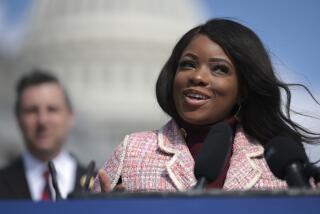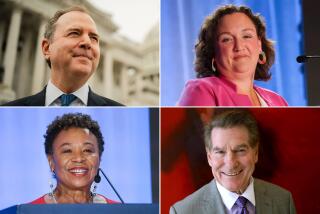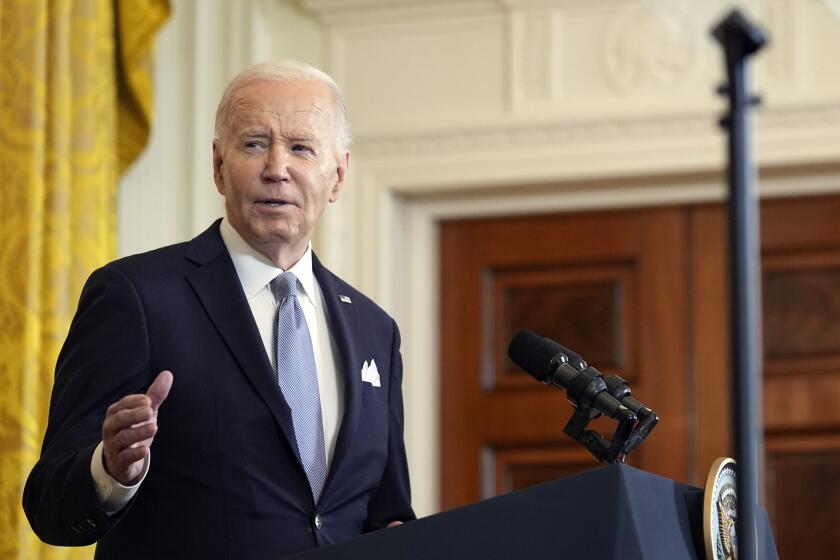Republicans Say the Sales Pitch Is in the Details
Congressional Republicans who have been nervous about overhauling Social Security got some of what they asked for in President Bush’s State of the Union address: more details of his plan to allow younger workers to invest part of their payroll taxes in personal retirement accounts.
Some Republicans believed that Bush’s elaboration -- on who would be eligible for the personal account option and on investment safeguards -- would help them fend off attacks from Democrats who called Bush’s plan a risky scheme that threatened the financial security of the elderly for the benefit of Wall Street.
“I was particularly encouraged to hear him lay out more of the details on what personal Social Security accounts should look like,” said House Speaker J. Dennis Hastert. “And before the president’s opponents get too worked up solely to scare seniors and play politics, I would hope both parties take the details of tonight’s speech to heart.”
But Bush still has not offered the kinds of details that would persuade many Republican fence-sitters to jump to his side. Deficit-conscious Republicans want to know how the costs of the transition would be paid for -- and on that point, Bush was noncommittal.
“While tonight’s speech laid out more detail than we have seen to date, I still believe at this point there are more questions than answers,” said Rep. Michael N. Castle of Delaware. “Personally, I need to see hard numbers and substantial details that would protect existing retirees before I can commit to any proposal.”
GOP lawmakers are counting on Bush doing far more to create a hospitable political climate for changing Social Security. He is taking his case for personal accounts to the country in a two-day, five-state barnstorming tour that begins today.
“He is going to have to do a full-out PR campaign around the country,” said a senior House Republican strategist, who requested anonymity. “One speech does not a campaign make.”
Before Wednesday’s address, Bush had used only generalities in his calls for revamping Social Security. He had identified certain broad principles, such as allowing personal accounts, but steered clear of key programmatic decisions, such as who would qualify and how the accounts would be constructed. Many Republicans had urged the White House to be more specific, if only to make it harder for Democratic critics to attack.
“The more details there are, the less we need to argue about the fantastical inventions of conspiracy theorists who insist this is a plot to turn the Social Security program over to a bunch of wealthy tycoons in jewel-encrusted mansions in New York,” said Eric Ueland, chief of staff to Senate Majority Leader Bill Frist.
Republicans said it was politically crucial for Bush to define who would be affected by proposed changes in Social Security. In Wednesday’s speech, the president said for the first time that only people under 55 would be offered the new option. Workers who have already retired or are close to doing so will not have to worry about their financial circumstances changing.
Rep. J.D. Hayworth of Arizona said that was “one of the most important details” Bush could offer, because it undercuts a pillar of Democrats’ opposition strategy: mobilizing senior citizens. “When they try to roll out the scare tactics again, I think this makes it harder to do that,” Hayworth said.
One Republican strategist said the age demarcation spoke to polls that had shown “anxiousness” about change among retired people and those nearing the end of their working lives, while younger people were more comfortable with change and talking about investments.
House Ways and Means Committee Chairman Bill Thomas of Bakersfield said the State of the Union speech sent different messages to different generations.
“Anyone who has retired or is near retirement has no concern about their guaranteed benefits,” said Thomas, whose committee will write the Social Security legislation. “But if you’re in your 30s or 20s, you should pay attention to this debate, because it is about your future.”
Republicans also welcomed Bush’s efforts to argue that the personal account option would be a safe, conservative form of investment with important safeguards against excessive risk.
“That’s a huge positive,” said a Republican pollster who asked not to be named. “They are trying to make it look like it is a very, very stable thing. It isn’t like going to the racetrack.”
Some Republicans in Congress who have pushed for larger accounts than Bush envisions were disappointed that he did not go farther.
“I’m glad he is tackling the issue, and it’s a good first step,” said Rep. Paul Ryan of Wisconsin. “We can take his proposal and improve on it in Congress. I’d like to make them bigger and make sure they start as soon as possible.”
But Ryan acknowledged that the White House was pushing a smaller account to reduce costs, and that Congress would face similar pressures. “We are going to have a juggling act between balancing the budget and also saving Social Security,” he said.
More to Read
Get the L.A. Times Politics newsletter
Deeply reported insights into legislation, politics and policy from Sacramento, Washington and beyond. In your inbox three times per week.
You may occasionally receive promotional content from the Los Angeles Times.







